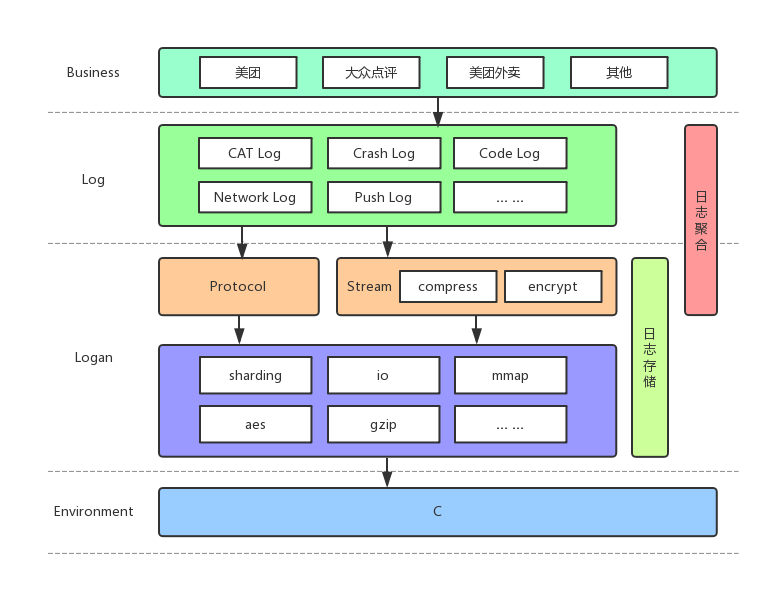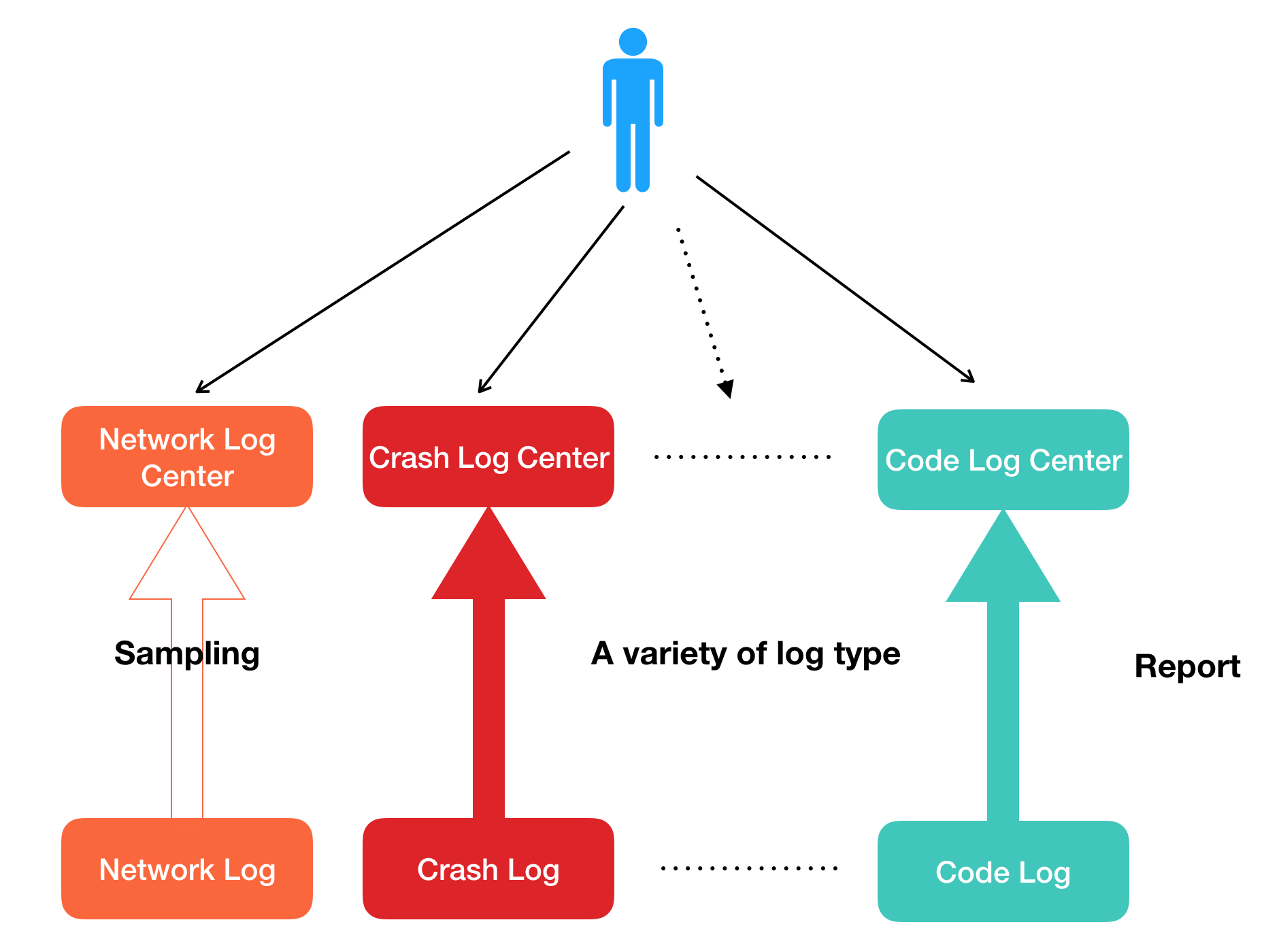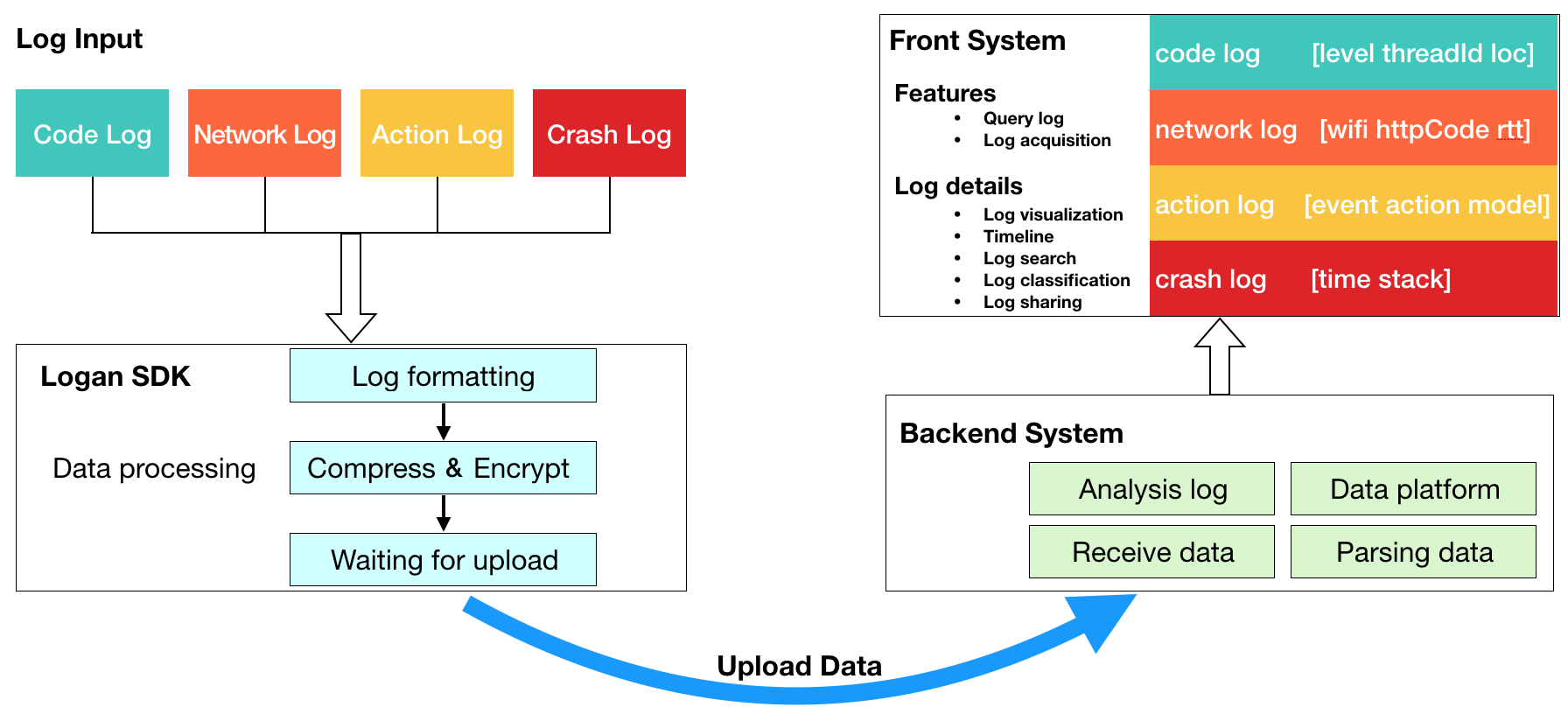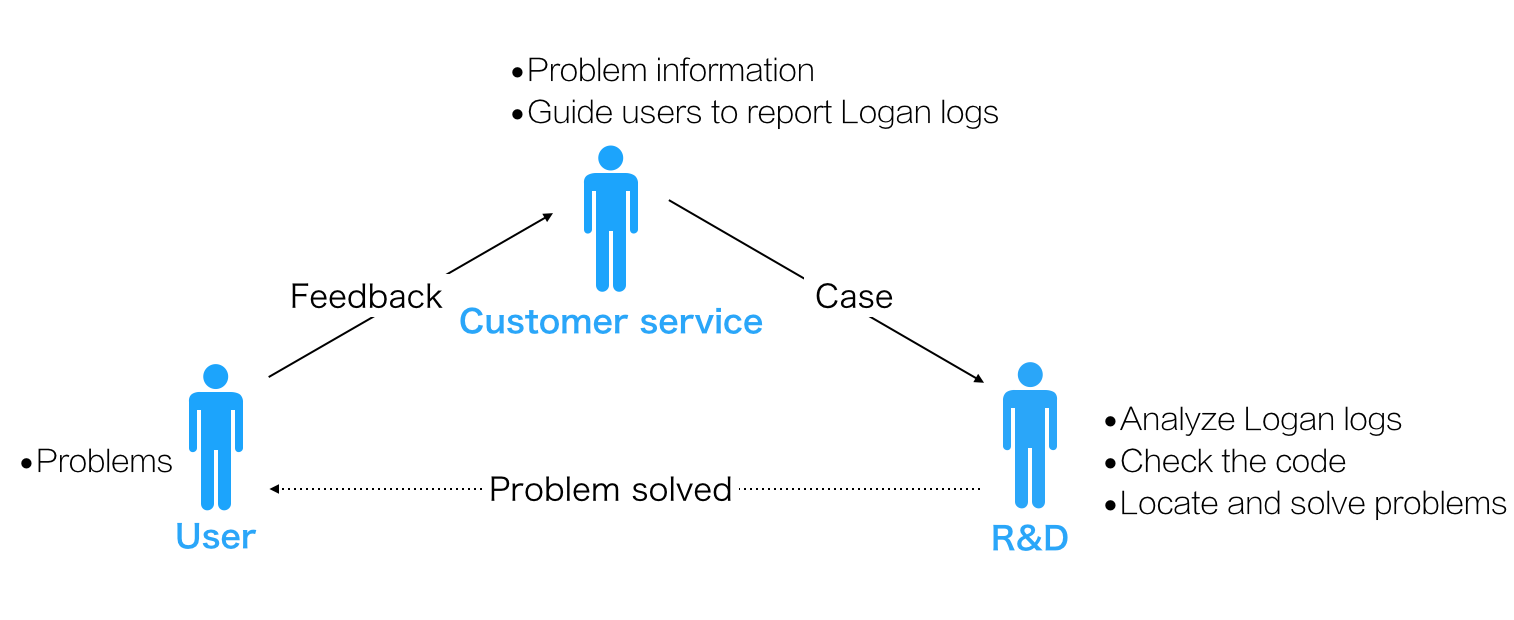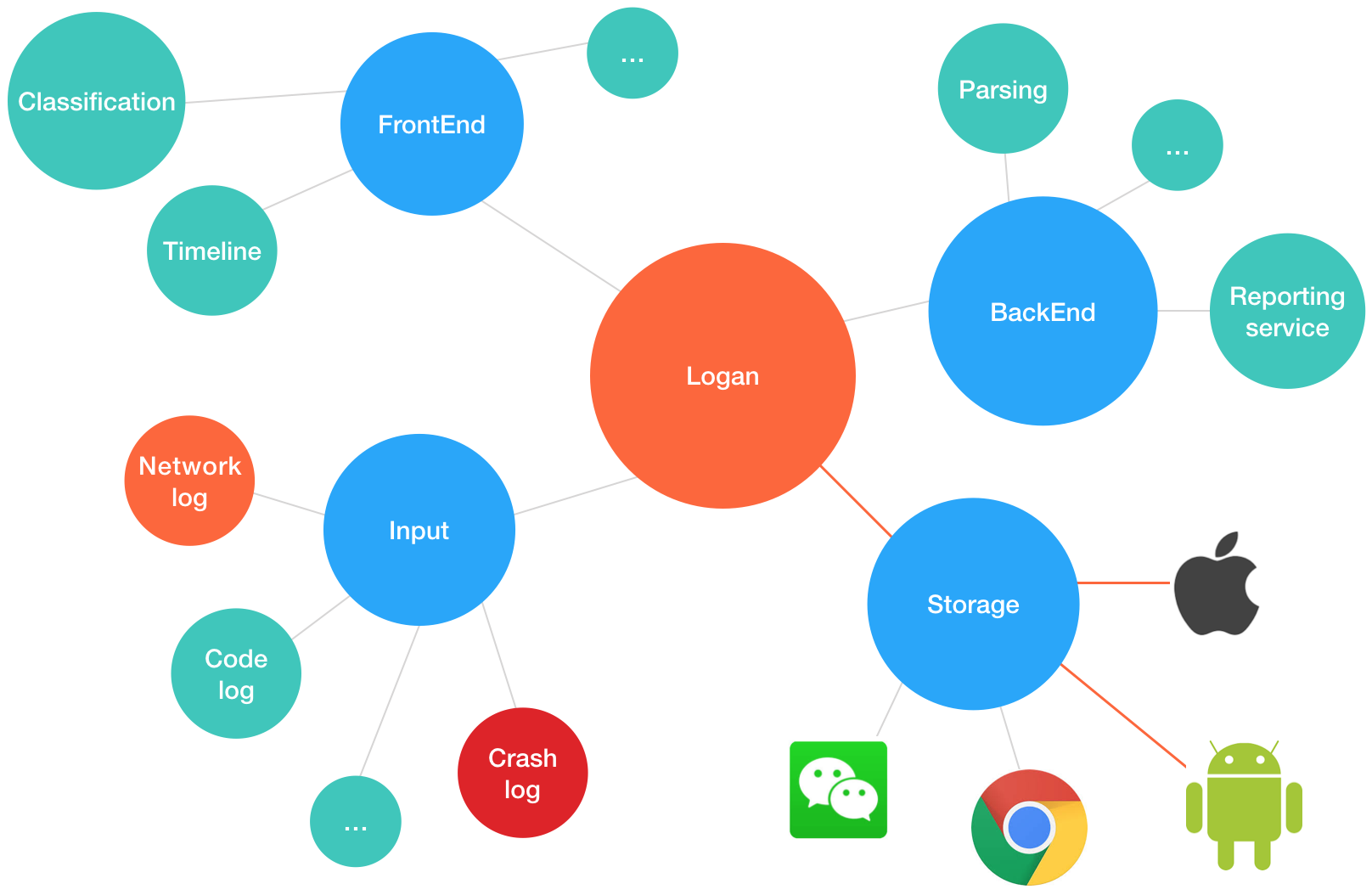Logan is a lightweight case logging system based on mobile platform.
If you want to build the source, make sure your NDK version is not higher than 16.1.4479499.
Add the following content in the project build.gradle file:
compile 'com.dianping.android.sdk:logan:1.2.2'You must init Logan before you use it. For example:
LoganConfig config = new LoganConfig.Builder()
.setCachePath(getApplicationContext().getFilesDir().getAbsolutePath())
.setPath(getApplicationContext().getExternalFilesDir(null).getAbsolutePath()
+ File.separator + "logan_v1")
.setEncryptKey16("0123456789012345".getBytes())
.setEncryptIV16("0123456789012345".getBytes())
.build();
Logan.init(config);After you init Logan, you can use Logan to write a log. Like this:
Logan.w("test logan", 1);Logan.w method has two parameters:
- String log: What you want to write;
- int type: Log type. This is very important, best practices below content will show you how to using log type parameter.
If you want to write log to file immediately, you need to call flush function:
Logan.f();If you want to see all of the log file information, you need to call getAllFilesInfo function:
Map<String, Long> map = Logan.getAllFilesInfo();- key: Log file date;
- value: Log file size(Bytes).
Logan internal provides logging upload mechanism, in view of the need to upload the log to do the preprocessing. If you want to upload log file, you need to implement a SendLogRunnable:
public class RealSendLogRunnable extends SendLogRunnable {
@Override
public void sendLog(File logFile) {
// logFile: After the pretreatment is going to upload the log file
// Must Call finish after send log
finish();
if (logFile.getName().contains(".copy")) {
logFile.delete();
}
}
}NOTE: You must call finish method after send log. As written in the code above
Finally you need to call Logan.s method:
Logan.s(date, mSendLogRunnable);One of the first parameter is date array(yyyy-MM-dd).
If you upload log file to server, you need INTERNET permission.
If you write log to SD card or read log info from SD card, you need WRITE_EXTERNAL_STORAGE and READ_EXTERNAL_STORAGE permission
Logan supports CocoaPods methods for installing the library in a project.
Import Logan in Xcode project, add Logan in podfile.
source 'https://github.com/CocoaPods/Specs.git'
platform :ios, '8.0'
target 'TargetName' do
pod 'Logan', '~> 1.2.5'
endThen run the following command:
$ pod installYou must init Logan before you use it:
#import "Logan.h"
NSData *keydata = [@"0123456789012345" dataUsingEncoding:NSUTF8StringEncoding];
NSData *ivdata = [@"0123456789012345" dataUsingEncoding:NSUTF8StringEncoding];
uint64_t file_max = 10 * 1024 * 1024;
// logan init,incoming 16-bit key,16-bit iv,largest written to the file size(byte)
loganInit(keydata, ivdata, file_max);
#if DEBUG
loganUseASL(YES);
#endifWrite a log:
logan(1, @"this is a test");logan method has two parameters:
- String log:What you want to write;
- int type:Log type. This is very important, best practices below content will show you how to using log type parameter.
If you want to write log to file immediately, you need to call flush function:
loganFlush();If you want to see all of the log file information, you need to call loganAllFilesInfo function:
NSDictionary *map = loganAllFilesInfo();- key Log file date;
- value: Log file size(Bytes).
Logan provides a method for obtaining log files and performs preprocessing operations on the logs that need to be uploaded. Log can be uploaded by implementing the network upload function.
loganUploadFilePath(loganTodaysDate(), ^(NSString *_Nullable filePatch) {
if (filePatch == nil) {
return;
}
NSString *urlStr = @"http://127.0.0.1:3000/logupload";
NSURL *url = [NSURL URLWithString:urlStr];
NSMutableURLRequest *req = [[NSMutableURLRequest alloc] initWithURL:url cachePolicy:NSURLRequestReloadIgnoringCacheData timeoutInterval:60];
[req setHTTPMethod:@"POST"];
[req addValue:@"binary/octet-stream" forHTTPHeaderField:@"Content-Type"];
NSURL *fileUrl = [NSURL fileURLWithPath:filePatch];
NSURLSessionUploadTask *task = [[NSURLSession sharedSession] uploadTaskWithRequest:req fromFile:fileUrl completionHandler:^(NSData *_Nullable data, NSURLResponse *_Nullable response, NSError *_Nullable error) {
if (error == nil) {
NSLog(@"upload success");
} else {
NSLog(@"upload failed. error:%@", error);
}
}];
[task resume];
});Copy Logan/parser-java to your project.
Parsing log data
new LoganParser(Key16.getBytes(),Iv16.getBytes()).parse(InputStream, OutputStream)Please refer to Example/Logan-Server/server.js.
Before Logan available, log report system is relatively scattered.
To put it simply, the traditional idea is to piece together the problems that appear in the logs of each system, but the new idea is to aggregate and analyze all the logs generated by the user to find the scenes with problems.
The Logan core system consists of four modules:
- Input
- Storage
- BackEnd
- FrontEnd
The new case analysis process is as follows:
A lightweight case logging system based on mobile platform developed by Meituan-Dianping — Logan
In the future, we will provide a data platform based on Logan big data, including advanced functions such as machine learning, troubleshooting log solution, and big data feature analysis.
Finally, we hope to provide a more complete integrated case analysis ecosystem.
| Module | Open Source | Processing | Planning |
|---|---|---|---|
| iOS & macOS | √ | ||
| Android | √ | ||
| Web | √ | ||
| Mini Programs | √ | ||
| Back End | √ | ||
| Front End | √ |
For more information about contributing PRs and issues, see our Contribution Guidelines.
-
White Bai - Core Developer - baitian0521
-
Richard Cao - Core Developer - Richard-Cao
-
jiangteng - Core Developer - jiangteng
-
yangxiangnan - Core Developer - yangxiangnan
-
Mr-xiaojun - Core Developer - Mr-xiaojun
See also the list of contributors who participated in this project.
Logan is licensed under the MIT License - see the LICENSE file for details.




